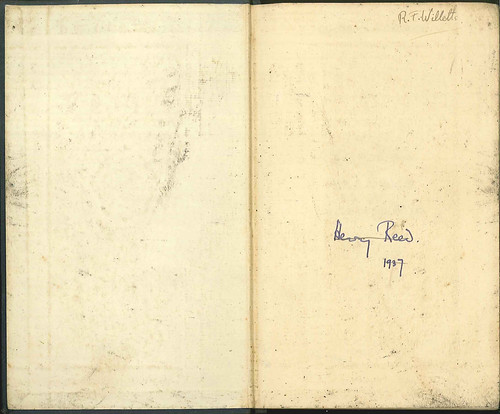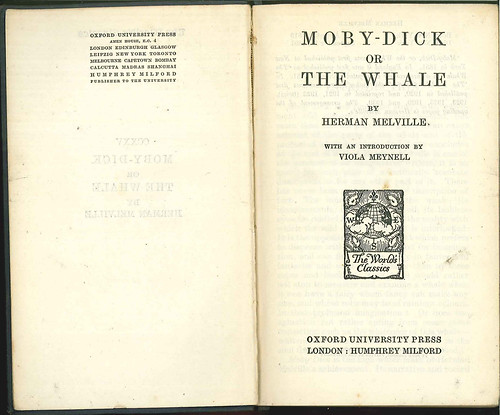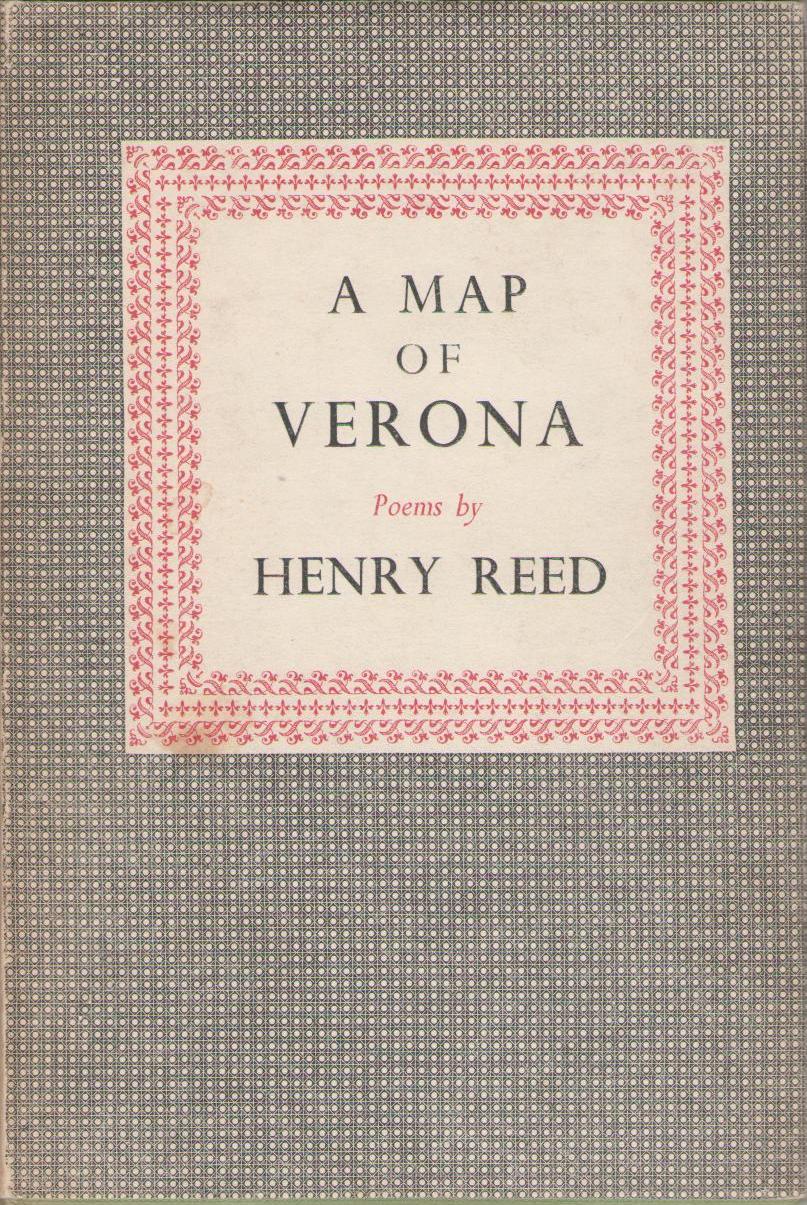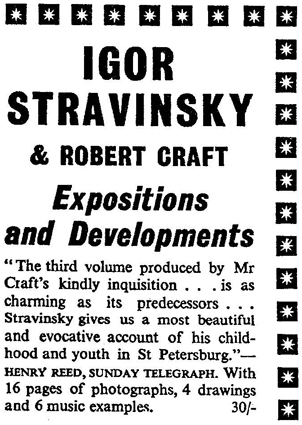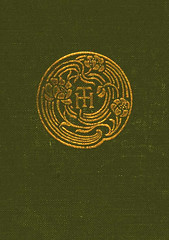|
|
Documenting the quest to track down everything written by
(and written about) the poet, translator, critic, and radio
dramatist, Henry Reed.
An obsessive, armchair attempt to assemble a comprehensive
bibliography, not just for the work of a poet, but for his
entire life.
Read " Naming of Parts."
|
Contact:
|
|
|
|
Reeding:
|
 |
I Capture the Castle: A girl and her family struggle to make ends meet in an old English castle.
|
 |
Dusty Answer: Young, privileged, earnest Judith falls in love with the family next door.
|
 |
The Heat of the Day: In wartime London, a woman finds herself caught between two men.
|
|
|
|
Elsewhere:
|
|
Posts from March 2011
|
|
|
27.4.2024
|
When I saw it advertised online I was by turns at first skeptical, and then conflicted: " Moby-Dick or, The Whale, by Herman Melville. London: University of Oxford Press, 1930. 676 pages plus a 16-page list of the Worlds' Classics—of which this is one; bound in dark blue cloth. Somewhat soiled on the covers and front endpapers. The free endpaper has the signatures of the poets Henry Reed (1937)—crossed out—and R.F. Willetts."
A quick search revealed that Ronald Frederick Willetts had been a Professor of Greek at the University of Birmingham. The bookseller was also in Birmingham. It would seem to be the right Reed. I felt, however, that buying this little piece of history would turn me into a Collector, capital "C". Perhaps I should leave the book in Birmingham for someone else? For a month the book languished in my online shopping cart, unpurchased, while I wrestled. In the end, avarice won the day. So here we have it, Henry Reed's personal copy of Moby-Dick:
Disappointingly, besides the two inscriptions, there is no marginalia or other marks. The silk bookmark is threaded between pages 14 and 15, in the first chapter, "Loomings":
Why did the poor poet of Tennessee, upon suddenly receiving two handfuls of silver, deliberate whether to buy him a coat, which he sadly needed, or invest his money in a pedestrian trip to Rockaway Beach? Why is almost every robust healthy boy with a robust healthy soul in him, at some time or other crazy to go to sea?
It seems unlikely—though still entirely possible—that this is the exact copy which Reed referred to when composing his radio adaptation of Moby-Dick for the BBC Third Programme (first broadcast January 26, 1947), much of which was written while Reed was living at Lovell's Farm, in Dorset. How the book came into the hands of Professor Willetts I can't say, but the two men traveled in much the same circles and it certainly seems likely that they would have known each other.
Ronald F. Willetts and Henry Reed were born a year apart—Reed in 1914 and Willetts in 1915. Both men were distinguished scholars and published poets. They attended the University of Birmingham in the 1930s, Reed going up in 1931 and Willetts in 1933; both read Classics under Professor E.R. Dodds, and studied Greek with Louis MacNeice during his tenure there. Reed took an MA in 1936 but was considered precocious; Willetts graduated in 1939. Both taught school before being called up for service during the Second World War. After the war, Reed went on to London to write for the BBC, while Willetts returned to Birmingham where he lectured in Greek until his retirement in 1981. It doesn't seem too far a stretch to believe that this book was a gift or loan.
Reed would seem to have been an admirer of Melville, in general. Besides his radio version of Moby-Dick, we also have him suggesting to Helen Gardner that Redburn may be a possible source for Eliot's "The Dry Salvages." The original working title of Reed's 1954 radio play Emily Butter was "Milly Mudd," and was envisioned as an all-female spoof of Benjamin Britten's operatic version of Billy Budd.
|
1537. Radio Times, "Full Frontal Pioneer," Radio Times People, 20 April 1972, 5.
A brief article before a new production of Reed's translation of Montherlant, mentioning a possible second collection of poems.
|
Henry had a cameo appearance on BBC Radio 3's Composer of the Week yesterday, in which Donald Macleod presented a history of musical fictions and hoaxes, " Unbelievable Spoofs." Well, not a cameo by the Old Man himself, but one of the plays from his Hilda Tablet series:
With the help of silent film accompanist Neil Brand we meet such dubious figures as Bolognese theatre composer Lasagne Verdi, famously submitted (and nearly printed) in the music world's most trusted encyclopedia, served for good measure with an accompaniment of Pietro Gnocchi. There's a chance to hear the music of Pietro Raimondi, the man who composed three oratorios to be performed simultaneously, centuries before Charles Ives conceived of such an adventure. Avant-garde composers reemerge from the BBC archive too, including Hilda Tablet whose 'reinforced concrete music' found its way into the repertory of Covent Garden in the 1950s. Plus a bizarre encounter with the man said to be a reincarnation of Merlin and Francis Bacon, variously described as a courtier, adventurer, charlatan, inventor, alchemist, pianist, violinist and amateur composer. But did he really exist? You'll have to make up your own mind.
Here, Mr. Macleod introduces a clip from Reed's satirical, all-female opera, Emily Butter (1954), ostensibly written by the twelve-tone composeress Hilda Tablet, supposedly performed at the Royal Opera House. This bit is "I Have a Little Mark On My Left Upper Arm":
Mr. Macleod says the performers are "unnameable," but Emily was, of course, famously voiced by Marjorie Westbury. Here is the 1960 Times "interview" with Dame Hilda, which is mentioned. The music for Emily Butter was written by the incomparable Donald Swann, and orchestrated by Max Saunders. Read The Times review of the original BBC Third Programme broadcast, from November 15, 1954.
Follow this link to listen to " Unbelievable Spoofs" in its entirety, until March 25. Thanks to the folks at the Friends of Radio 3 forums for leading me to this broadcast!
|
1536. L.E. Sissman, "Late Empire." Halcyon 1, no. 2 (Spring 1948), 54.
Sissman reviews William Jay Smith, Karl Shapiro, Richard Eberhart, Thomas Merton, Henry Reed, and Stephen Spender.
|
Here's something not often seen in the wild: a 1956 reprint of Reed's A Map of Verona (London: Jonathan Cape). Though he only published this one volume of poetry, it remained in print for almost a quarter of a century, from 1946 until its last reissue in 1970:
Note the new dustjacket design (compare covers over on my Flickr page). This copy is for sale on AbeBooks.com by S. Edmonds Harrell, Book Services.
|
1535. Reed, Henry. "Talks to India," Men and Books. Time & Tide 25, no. 3 (15 January 1944): 54-55.
Reed's review of Talking to India, edited by George Orwell (London: Allen & Unwin, 1943).
|
When Henry Reed's career is summed up into a few paragraphs for a reference book or introduction, his varied jobs are usually listed in descending order of how he is remembered: poet, radio dramatist, translator. On occasion, the title "journalist" is added, but what they really mean is freelance critic: writing book reviews. Reed was the fiction critic for the New Statesman from 1944 to 1946, and wrote the "Radio Notes" column there from 1947 to 1948. He reviewed fiction in the Listener from 1946 to 1947, and again during 1950 and 1951. Here and there he was commissioned to write pieces on poetry collections or translations, and he was a frequent contributor to the Radio Times when he was writing scripts for—and giving talks on—the BBC.
At least twice in the early 1960s, Reed reviewed books for the Sunday Telegraph, and there are probably more. I don't have any sort of access to the Telegraph locally, however, so a dedicated search will probably have to wait for another trip to the Library of Congress.
Here, in the Times (London) on June 7, 1962, we find a Faber & Faber advertisement for Expositions and Developments, one of a series of collaborative conversations between the composer Igor Stravinsky and conductor Robert Craft. The blurb is an excerpt from Reed's Telegraph review:
Then, in an issue of the Bookseller from 1962, an article concerning recent reviews of Georges Simenon's Pedigree, in which Reed duels with both Anthony Burgess and Raymond Mortimer:
A book described in last Sunday's Observer as one of 'almost indigestible richness' seemed to have been digested pretty well by Mr. Henry Reed, writing in the Sunday Telegraph, and not found all that rich, either. Mr. Reed was not too happy about the translation, to start with. He happened to know that the original version of Georges Simenon's Pedigree (Hamish Hamilton) was written in the present tense, and thought that the translator had lost something by putting the English version in the past tense. Mr. Anthony Burgess, who wrote the Observer review, regarded the translation as admirable, as did Mr. Raymond Mortimer in the Sunday Times. But Mr. Reed was also worried about the original; the reader was likely to get helplessly lost, he thought, among the 'phalanxes of aunts and uncles' who drifted in and out of the story. Mr. Burgess thought that the author's characters were convincingly solid and one could walk around them because they filled real space. This reviewer judged the book as a remarkable work of art, and thought that M. Andre Gide's advice to the author to recast an earlier autobiographic version as a novel in the third person was good. Not so for Mr. Reed; for him, M. Gide's advice was 'rather insensitive'. Mr. Mortimer's review of M. Simenon's book was notable for, in the midst of his customary sound appraisal, an anecdote which must not go unrecorded in this paper. The book ended, observed Mr. Mortimer, with the hero at the age of fifteen; he had 'just been sacked from his first job (in a bookseller's) because he knew more than his employer'.
I also have a few intriguing but disappointingly unspecific references to reviews penned by Reed for the Sunday Times. If I can find my notes, I'll have to post something on those. If for no other reason, so I can easily look it up the next time I'm in a library with British newspapers on microfilm, at least until Sundays appear in the online archive for the Times.
|
1534. Reed, Henry. "Radio Drama," Men and Books. Time & Tide 25, no. 17 (22 April 1944): 350-358 (354).
Reed's review of Louis MacNeice's Christopher Columbus: A Radio Play (London: Faber, 1944).
|
A critique of the design of the 1947 American edition of Reed's poems, from Bookbinding and Book Production, 1948 (p. 85):
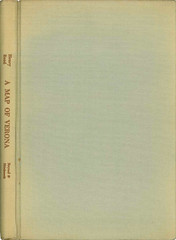 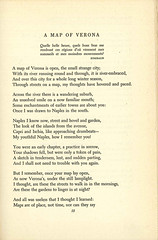 A Map of Verona
By Henry Reed. 5¼ x 8½. $2.50.
Publisher: Reynal & Hitchcock, Inc.
Manufacturer: Cornwall Press
Type: Lino. Electra 10/13: 24x38
Stock: Perkins & Squier 60, 2R
Binding: Athol Teralin, light green
Stamping: dark brown ink
Designer: Gerald Gross
The format for this collection of poems is without stimulation. The case is stamped only on the length of the spine in brown ink and the pattern and color of the cloth is uninspired. The book is rough trimmed; my own inclinations are always to trim, unless hand made paper or a deckle edged sheet is used. The presswork-lineup and binding are poor. There is little correlation between the front matter pages and the tenor of the text, and it would seem that the designer didn't have enough time to pay the necessary attention to details. The poetry is nicely set in Electra 10/13 with with heads in 12pt. Roman caps in Bodoni Book. The folios could have been larger than the 8pt. italic: this way they look as though they were trying to hide. The author is a man of considerable verbiage and very often there are one word runovers and where these occur, they are flushed right, directly under the end of the preceding line, it may make for easier carry-over of thought, but I'm not sure that the effect is pleasing when looking at the page. I didn't waste time sending my eye back to the beginning of a new line, but I did fumble at first until I was able to adjust to it. '[A] man of considerable verbiage.' There's an understatement. If there is a British analogue of this publication, I'd love to see the entry for the 1946 London edition, published by Jonathan Cape.
|
1533. Friend-Periera, F.J. "Four Poets," Some Recent Books, New Review 23, no. 128 (June 1946), 482-484 [482].
A short review calls A Map of Verona more pretentious than C.C. Abbott's The Sand Castle; influenced by Eliot, Auden, MacNeice, and Day Lewis.
|
Well, what have we here? In the pages of Italy Writes: A Review for Those Who Read ( L'Italia che scrive; rassegna per coloro che leggono), the journal of the Leonardo Foundation of Italian Culture, Rome ( Fondazione Leonardo per la cultura italiana), an announcement from a 1947 Italian writers' festival ( Settimana degli scrittori):
Dal 24 al 26 settembre si è svolta, sempre in Perugia una Settimana degli scrittori, con relazione di Giacomo Debenedetti sul Teatro e romanzo della realtà e teatro e romanzo dell'esistenza. Erano presenti il poeta inglese Henry Reed, il prof. Kardos, studioso dell'umanesimo in Ungheria, nostri letterati, critici, scrittori e filosofi come Bellona, Toschi, Della Volpe, Tecchi, Banfi, Contini, Capitini, Bigiaretti, Mila, Ronga, Vigorelli, Cantoni, D'Amico, Pandolfi, Guerrieri.
Which roughly translates as: "From September 24 to 26 took place, again in Perugia a Week of the writers, with relation of Giacomo Debenedetti on the theatre and novel of truth, and the theatre and novel of life. Those present included the English poet Henry Reed, Professor Kardos, a scholar of humanism in Hungary, our writers, critics, and philosophers such as Bellona, Toschi, Della Volpe, Tecchi, Banfi, Contini, Capitini, Bigiaretti, Mila, Ronga, Vigorelli, Cantoni, D'Amico, Pandolfi, Guerrieri."
Emphasis mine, of course. If anyone has a better grasp of Italian, I'd encourage you to leave a comment or drop me an e-mail!
We had previously found Reed talking about having attended the Festival of Sacred Music in Umbria, held at about the same time, from September 21 through October 5, 1947. I believe the concurring writers' festival in question has evolved into the Umbria Libri, an annual book festival in Perugia.
|
1532. Vallette, Jacques. "Grand-Bretagne," Mercure de France, no. 1001 (1 January 1947): 157-158.
A contemporary French language review of Reed's A Map of Verona.
|
Robert Gittings was an author and poet, and from 1940 to 1963, a script writer and producer at the BBC. His award-winning book, John Keats (1968), is considered the definitive biography. Following this, he then set his sights on Thomas Hardy. From Gitting's obituary in the Times (London), of February 21, 1992:
Gittings's next project was a life of Thomas Hardy, of whom no biography had by then appeared that could be described as even adequate. His edition of Emma Hardy's Some Recollections (1961), done in collaboration with another writer, had received very rough handling from the late Henry Reed and was subsequently revised. Reed, who had known the second Mrs Hardy well, had for long been expected to write the definitive biography. But illness prevented that happening. Gittings failed to obtain Reed's co-operation in his work. This was a loss, as Michael Millgate's later biography, written with the benefit of Reed's expertise, showed.
Gittings accomplished his task in two volumes: Young Thomas Hardy (1975) and The Older Hardy (1978). These were received with respect and (especially the first volume) with gratitude for bringing hitherto unknown facts to light.
The "rough handling" of Gitting's 1961 book, Some Recollections By Emma Hardy and Some Relevant Poems By Thomas Hardy, comes from "Veteris Vestigia Flammae" ("scars of an old flame"), Reed's review in the Listener on October 26, 1961. Reed, of course, had spent decades on his own biography of Hardy, and may have taken offense that he was not consulted. He makes insinuations as to an over-reliance on what he calls "gossip," and then proceeds to call into question the editors' reliability:
It is a little surprising to see the name of Miss Evelyn Hardy [no relation] associated with the presentation of these difficult pages; her past achievements in the way of transcription have not been of a kind to beget confidence. It is to be hoped that the presence of Mr. Robert Gittings has guaranteed the general accuracy of the text; he has not, of course, been able to hold completely in check Miss Hardy's passion for irrelevant annotation: perhaps he feels that this has sometimes a wild charm of its own. Mr. Gittings has himself edited a small anthology of poems, appended to the main text, which may be considered to have a definite or possible derivation from the Recollections themselves. There is naturally room for minor disagreement about some of his choices, but most of what he has to say is very illuminating; and all of it is worth the closest attention. (p. 678)
Returning to Gitting's obituary, we note that Michael Millgate's 1982 life of Hardy, "written with the benefit of Reed's expertise" (as well as that of consummate bibliographer, Richard L. Purdy), would become the definitive Hardy biography. So how much, exactly, did Millgate benefit? Quite a bit, it turns out! Millgate inherited all of Reed's Hardy research and drafts. We can see, in the finding aids for the University of Toronto's Fisher Rare Book Library, a list of six boxes of notes, correspondence, and documents relating to Millgate's Hardy books. Among the items listed are:
Box 5, 17 folders (Howard Bliss/Henry Reed): (Folder 1) Howard Bliss/Lew Feldman correspondence
(Folder 2) Howard Bliss: inscribed, presentation or signed
(Folder 3) Henry Reed: drafted sections of projected Hardy biography
(Folder 4) Reed: misc. biographical passages re: Hardy
(Folder 5) Reed: notes and drafts re: Hardy novels
(Folder 6) Reed: Notes on conversations with Hardyís widow, 'Important'
(Folder 7) Reed: reviews of Hardy items, article on Hardy
(Folder 8) Reed: scripts for Hardy programs
(Folders 9-10) Reed: unpublished thesis on T.H. biography
(Folder 11) Reed: misc. reviews and lectures Ms. Michael Millgate
(Folder 12) Reed: misc. biographical items (clippings)
(Folder 13) Reed: MM correspondence, re: his papers
(Folder 14) Correspondence: Reed/Purdy, 1949-1977
(Folder 15) MM/Reed, carbons, 1969-1981
(Folders 16-17) Reedís comments on MMís Hardy biography Box 6, Henry Reed notebooks (5 holograph notebooks in box): (1) 1912-1913, brief intro. by Henry Reed on THís poems, Poems of 1912-1913
(2) HR notes on Dorchester 1851 census...
(3) HRís outlines of a few chapters of projected biography...
(4) HRís extensive notes (some on loose sheets) on Hardy family history
(5) HR notes on the early novels...
|
1531. Henderson, Philip. "English Poetry Since 1946." British Book News 117 (May 1950), 295.
Reed's A Map of Verona is mentioned in a survey of the previous five years of English poetry.
|
|
|
|
1st lesson:
Reed, Henry
(1914-1986). Born: Birmingham, England, 22 February 1914; died: London, 8
December 1986.
Education: MA, University of Birmingham, 1936. Served: RAOC, 1941-42; Foreign Office, Bletchley Park, 1942-1945.
Freelance writer: BBC Features Department, 1945-1980.
Author of:
A Map of Verona: Poems (1946)
The Novel Since 1939 (1946)
Moby Dick: A Play for Radio from Herman Melville's Novel (1947)
Lessons of the War (1970)
Hilda Tablet and Others: Four Pieces for Radio (1971)
The Streets of Pompeii and Other Plays for Radio (1971)
Collected Poems (1991, 2007)
The Auction Sale (2006)
|
Search:
|
|
|
Recent tags:
|
Posts of note:
|
Archives:
|
Marginalia:
|
|







